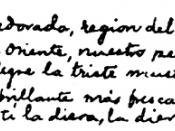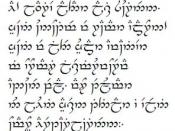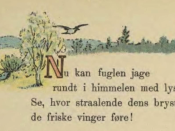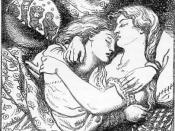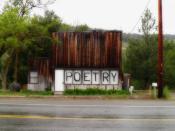Students always face the challenge of wanting to explore a thought or lesson on their own. However, majority of the time, they sit in a classroom listening to lectures and doing book-work rather than learning through their own ways. The diction and imagery in "When I heard the learn'd astronomer," exemplifies the confining feeling of books and second-hand learning; however after the shift, the speaker reveals a deep appreciation of exploring through your own way.
Through diction, the poem reveals the sense of patronizing, structured learning. The speaker illustrates hardness to book learning through consonance. In line two, proofs, figures, and columns all endure a stern sound to them, creating the feeling of stress. This happens again in line five, with "Lecture-room." This represents a tense setting, a place the speaker does not want to be. The speaker imparts a sense of confinement, using the "Lecture - room," while adding even more emphasis to it by its capitalization and indention of its own line.
In the second stanza, diction changes dramatically, from structured to a whimsical air. Rising and gliding portray a sensual outlook, as the speaker is now more open and free.
The speaker puts forth a monotonous tone throughout the first stanza, creating the feeling of repetition and hostility. The poem is written in a single sentence, emphasizing every point. In the first stanza, the tone is repetitive - its drags on until after the shift. It is as if the speaker is bored, wanting more than what is there. Every line begins with "Whenâ¦" representing an uncaring thought process. Imagery shown throughout this stanza can be hostile. A young boy is pictured, lazily trying to listen and do work, however his mind not with the professor, is yearning for something more. Moreover, there by using astronomer instead of professor, or teacher, shows lack of respect. The monotony of this poem is emphasized so intensely, it is as if you are the speaker, sitting in a classroom with a wandering mind.
After the shift, a tranquil outlook on how he perceives learning on his own, through imagery is portrayed. "the mystical moist night-air," makes you want to run outside and just to see if it is true. This is an enormous change of view from the first stanza. The writing style in this paragraph is that of icing on a cake, beautiful and delicious. The speaker seems relaxed; now on his own, able to experience what was wanted. "Look'd up in perfect silence at the stars," emphasizes how in awe this person is in. Finally able to see through his own eyes and not through a book or the astronomer, the speaker is silent, taking it all in, not missing anything.
"When I heard the learn'd astronomer" efficiently demonstrates the point of view between book knowledge and personal experience. Throughout this one-sentenced poem, the speaker introduces his thoughts on book-based learning verses experiential learning. Through articulated imagery, the need and want of personal experience is identified. Nevertheless, without first experiencing book-based learning, the speaker would not have fully experienced personal exploration in as much aspired awe. To understand the grand scale of how one works, a person must go through every process, endure everything to achieve such an intimacy as the speaker endured in the end.
